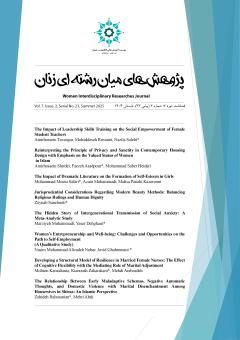Subject Areas :
Nasim Mohammad ali zadeh nobar 1 , Javid GHahremani 2
1 - Bachelor's in Psychology, Faculty of Psychology, Payame Noor University of Ahar, Tabriz, Iran.
2 - Assistant Professor, Research Institute for Development and Planning, Academic Center for Education, Culture and Research, Tabriz, East Azerbaijan, Iran.
Keywords: Women Entrepreneurship, Well-being, Self-employment, Self-Determination Theory, Gender Roles, Work-life Balance, Entrepreneurial Training.,
Abstract :
This qualitative study explores the personal well-being experiences of entrepreneurial women in Tabriz who have embarked on the path of self-employment. The aim is to analyze how these women face the challenges and opportunities along their entrepreneurial journey while maintaining and enhancing their well-being. Data were collected through semi-structured interviews with 20 purposefully selected women entrepreneurs and analyzed using MAXQDA software. The data analysis was grounded in the Self-Determination Theory (SDT).Findings indicate that two primary factors contributed to the enhancement of these women's well-being: (1) spirituality and faith, serving as sources of resilience and purpose, and (2) work-life balance and the quality of family relationships as key elements of well-being. Entering the realm of self-employment increased their sense of autonomy and flexibility, thus enhancing their well-being through improved physical health, family relationships, and personal satisfaction. Nevertheless, participants faced challenges such as stress from balancing professional and personal responsibilities. The results also highlight the important role of entrepreneurial training in boosting motivation and success, aligning with SDT components of autonomy, competence, and relatedness.By addressing existing gaps in the understanding of women entrepreneurs’ well-being, this study contributes to the literature in this field and emphasizes the importance of resilience and the need for specific support, particularly from spouses.
